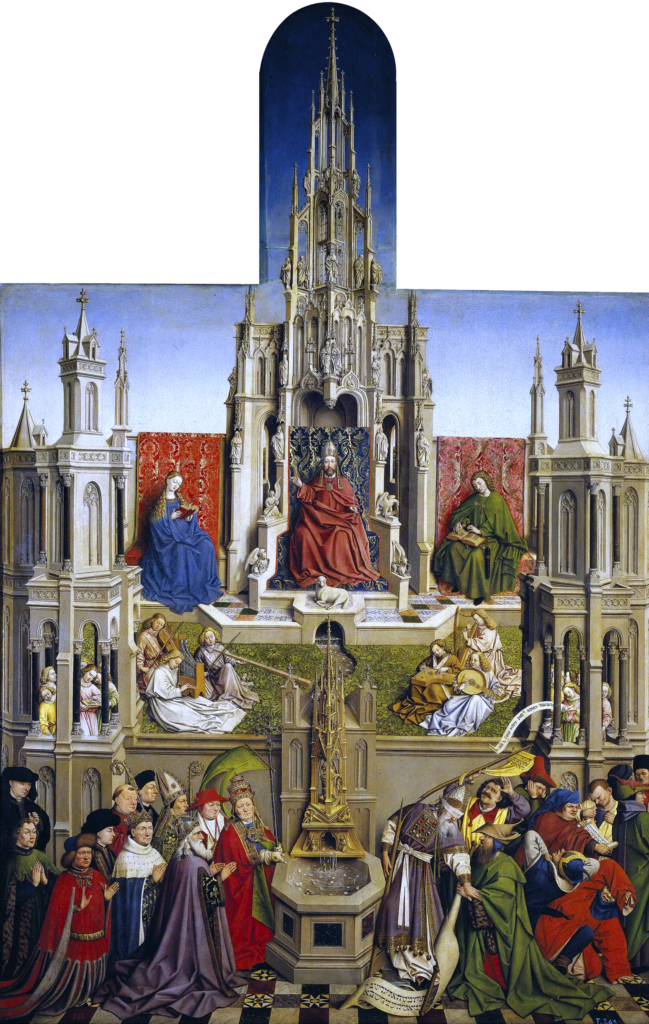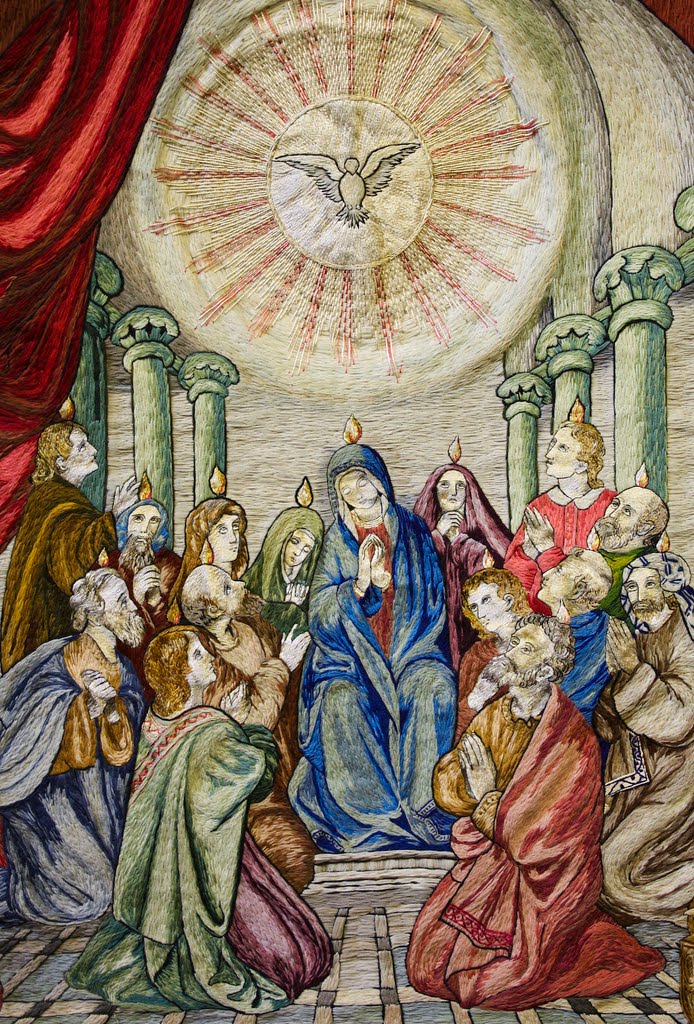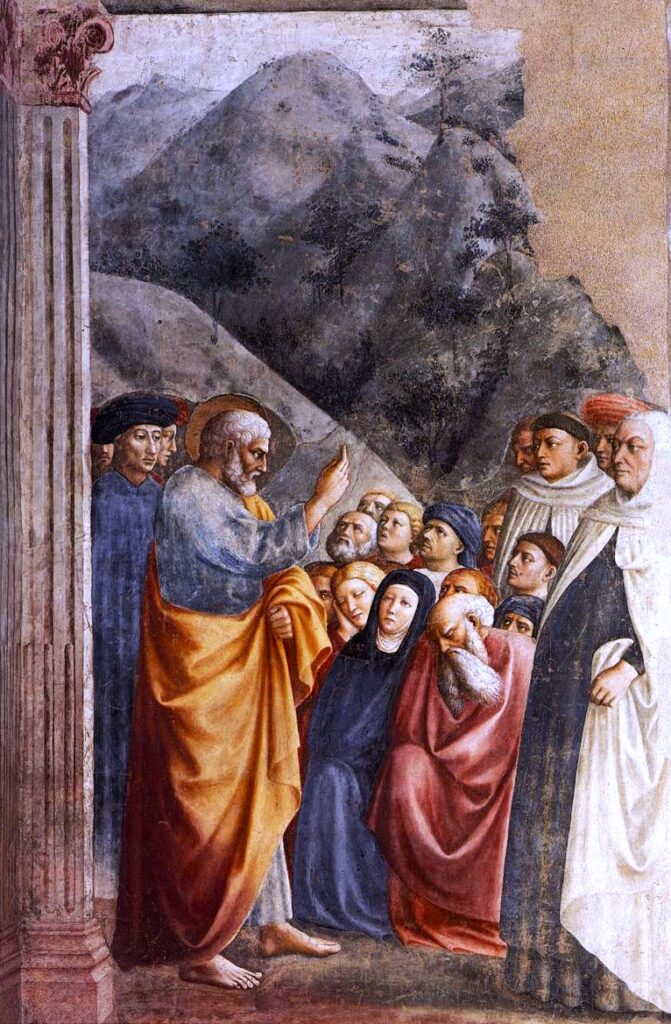A Reading From the Gospel of John
On the evening of that first day of the week, when the doors were locked, where the disciples were, for fear of the Jews, Jesus came and stood in their midst and said to them, “Peace be with you.” When he had said this, he showed them his hands and his side. The disciples rejoiced when they saw the Lord. Jesus said to them again, “Peace be with you. As the Father has sent me, so I send you.” And when he had said this, he breathed on them and said to them, “Receive the Holy Spirit. Whose sins you forgive are forgiven them, and whose sins you retain are retained.”
Transcription of Sermon
And He breathed on them and said, “Receive the Holy Spirit, who sins you forgive, they are forgiven them.”In the Name of the Father, and the Son, of the Holy Spirit, Amen.
In today’s Gospel, we see something of a preview of the day of Pentecost where there’s this reception of the Holy Spirit in some mysterious way which will then be completed on the day of Pentecost. What is Pentecost?
By the way, we heard in the Acts of the Apostles that the Jews were in Jerusalem for Pentecost. Well, I thought Pentecost was the day of the descent of the Holy Spirit. Well, it will be and it became that on that day, but before that Pentecost was the Greek name for the Hebrew feast of the Shabbat, and Shabbat was one of three liturgical feasts of the Jews that demanded a pilgrimage to Jerusalem, and that’s why there were so many Jews from all different lands and cultures and languages, gathered the Holy City because it was the feasts of a pilgrimage. And what is Shabbat? What was Pentecost?
It commemorated the seven weeks from Passover to the reception of the Law when Moses went to the Mount Sinai, and God descended in the form of cloud, fire, and smoke. And Moses received the Law written on stone. That was seven weeks after Passover. And so, seven weeks after Passover all the Jews are in Jerusalem, that can make it, they’re there, and seven weeks later, what happens?
The Holy Spirit comes down in the form of tongues of flame on the Disciples, who are awaiting obediently, having completed the first novena in the history of the Church, was nine days of prayer and penance in expectation of the Holy Spirit. Notice too, that we have these bookends from Ash Wednesday to Pentecost. These two bookends of penance in preparation for celebration for feasts.
There’s a secret of the spiritual life that we can never truly celebrate the mysteries of the life of Our Lord if we haven’t first done penance. We can’t feast if we haven’t fasted; it’s just a fact. And that’s why the Catholic Church, you do Lent really well, and as a result, we understand and we can experience the feasts because we have allowed Our Lord to do a certain purification through the penitential seasons. Of course, the degree with which we carry out our penances, our prayer, and almsgiving is going to determine the degree of rejoicing on the feasts. So that’s something that is, in a certain sense, is in our hands. And that’s also a microcosm of our life and eternal life. To the degree to which we die to ourselves in this life, will we have a corresponding glory in Heaven later.
In the Acts of the Apostles, it says, “They were filled with the Holy Spirit”, ἐπλήσθησαν. Ἐπλήσθησαν is the Greek word that Luke uses. Luke has the riches of Greek of all of the New Testament writers because it was his first language. And when if you’re studying Greek and read John’s Gospel, John has a really simple, simple vocabulary, the syntax is not complex. After a few months of studying Greek, you read John, you think, “I got this”, and then you read Luke and you say, “No… this Greek is pretty tough, actually. I don’t really understand it.” He is tough; Luke is tough. And so, don’t get discouraged, okay? When you start using Greek study, save Luke for later or you’re gonna quit. Well, he uses this word ἐπλήσθησαν – they were filled – which means completion, perfection.
This last week, I was seasoning the bag on my bagpipes, and I had to make it airtight. And so, I filled it up, just couldn’t get any more breath in the bag. And I let it sit there to see if truly was airtight. It was corked shut. I would wait five minutes, try and blow some more air into the bag to see if it’s airtight or not — couldn’t get any end. That’s full. Full means nothing more fits.
When they were filled with the Holy Spirit, and not more, fit, He filled them perfectly, completely. And, there’s something that you’ll read in the old manuals about the mystical life called confirmation in grace. Confirmation in grace means — we see this in the lives of certain saints who have achieved Mystical Marriage with Our Lord, and we see it definitely in the Apostles on the Day of Pentecost — conformation in grace means that they were so configured with the will of God, the Holy Spirit was so replete in them, they could not commit a mortal sin. And Our Lord did this. He confirmed them in grace so that they would never give bad example in evangelizing and spreading Christ’s saving message. And so, they have this super-abundant reception of God Himself.

As a result of the way grace works, there’s a doctrine called redundancy. Redundancy is really interesting because it means grace and sin flow downhill. So, grace comes out from the Godhead, onto the Pope, on the Cardinals, bishops, priests, parents, children, and there is this stream of grace. When, if one were to commit a mortal sin in that trajectory that becomes what’s called an obex. An obex, is a hindrance to grace and, as a result, the grace is interrupted, cannot flow downhill, rather the effects of sin flow downhill. So, there is no such thing as private sin. And that’s also why Our Lord protected the Apostle so that they wouldn’t become anti-apostles through a mortal sin. That’s why they were confirmed in grace.
Now, when the Jews would celebrate Shabbat, they remembered the Law that had been given to them seven weeks after Passover, and how would they remember it? Well, they did their pilgrimage, and they would bring the first fruits of their harvest. So, it was a remembrance and also harvest feast, and they would bring the first fruits, the wheat, or whatever it was, as a sacrifice.
Thomas Aquinas says something that’s really fascinating: He says the Old Law was written on stone and impossible to keep. The New Law of the Holy Spirit is written on our hearts of flesh, and it’s the Holy Spirit, Himself, who helps us keep it. So, we’re not abandoned to our weakness, to our foibles, to our inconsistencies, but there is another protagonist in our spiritual lives, in our moral lives, in our lives of worship, in our lives of faith. This as, John the 23rd calls Him, “This hidden God,” the Holy Spirit who is working in such a humble, sublime, invisible way.
Our Lord prepares the Apostles for Pentecost and He breathes on them. Now this is really important, this gesture that Our Lord does; He breathes on them. When was the last time we saw God breathed on man? It was in the creation of Adam. In Genesis, as soon as He formed him out of clay, what did he do? He breathed on him; His רוח (ruah) in Hebrew, His Spirit, shared His supernatural life with Adam. That means Adam was created in grace. So, he was created in grace. We were conceived in original sin, not Adam, not Eve. But then, they became an obex – right? – as a result of original sin. And, you know, their feast day is December 24. So, they made it, okay. We’re all happy for Adam and Eve. They ruined it for a lot of the rest of us, but they made it themselves. So, congratulations, Adam and Eve.
Well, because of this interruption of Grace, God comes and breathes on us again. This is the re-creation; this is the new seventh day. This is the day of creation of man in which we are made anew through grace, thanks to the Passion, the Death, the Resurrection of Christ. And then, on Pentecost, seven weeks after Easter, what happens? The Holy Spirit descends in the form of tongues of flame. Tongues of flame. Bede the Venerable says that the Holy Spirit appeared in the form of tongues of flame in order to inflame their hearts and open their tongues.
And so, what we see is something of an anti-Babel; it is a solution to the Tower of Babel, where as a result of man’s pride, trying to become like God once again. It didn’t go so well the first time in original sin, and now they build this tower to try and arrive to the heavens. And then, we see in almost comical terms, Our Lord, He looks down, He kind of moves the clouds away to see how this tower is coming. Is it really going to make it up to here to heaven? And then it says, God descended. So, they didn’t really make it too far with their feeble attempt at a tower. And what did He do? He sows confusion. Confusion is the result of pride. Because when we’re proud, we do not see anything clearly. And as a result, there is this confusion of tongues. Well, ardentes utique ex se, et loquentes de se, says Bede the Venerable. That they were made ardent by Him in order to speak about Him. The Apostles received this invasion, this divine invasion, and then, speak their own tongue, but everybody else hears their own. This is the solution to Babel.
And notice, too, that the gift of tongues has two expressions: The first expression is what we see in Acts Chapter 2, in which they speak their own language and are understood in other languages. The other expression of charismatic gift of tongues we see in the lives of certain saints like Vincent Ferrer, for example, who only spoke Spanish, Latin, and Italia, but when he went to Hungary, or when he went to Germany to do missions, he could speak Hungarian or German at the level of his mother tongue, Spanish. So, this is another expression of the gift of tongues, but notice, that the common denominator of the gift of tongues is intelligibility. Why? Because God is logos; He is intelligibility itself. He is the one who gives sense and reason to all things.
God led His people out of slavery, in the original Passover, as column of fire. He appeared to Moses in a burning bush that didn’t suffer damage from the flames. God is called the consuming fire in the Old Testament. And so, He shares Himself, fills, enflames the hearts of His Apostles, and then takes up residence in their souls.
And notice too, this immediate transformation in Peter, who had denied Christ three times out of fear of the Jews; he goes, filled the Holy Spirit, onto the street and says, “You crucified Jesus of Nazareth. If you’re not baptized, if you don’t repent, you will die in your sins.”
Notice that the first words of the Apostle after Pentecost are not about climate change, they’re not about recognizing youth unemployment and the need to set up NGOs to address social concerns, okay. The first thing that Peter says regards the most important; conversion, baptism and repentance, salvation. In other words, the only things that ultimately really matter.
And so, we see the gifts of the Holy Spirit at work. The gifts are those permanent dispositions that make us docile to the promptings of the Holy Spirit. But then, we see as a result of the action of the gifts, we see the fruits of the Holy Spirit, these present perfect perfections in a soul that revealed future glory. And that is the story of Peter; timorous, frightened man, now ardent Apostle. That is to be our story as well.
In the Name of the Father, and of the Son, of the Holy Spirit. Amen.
— Fr. Ermatinger


